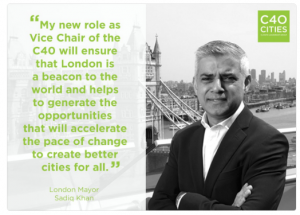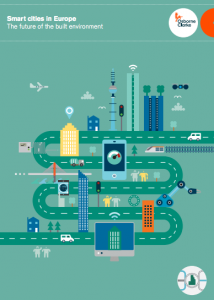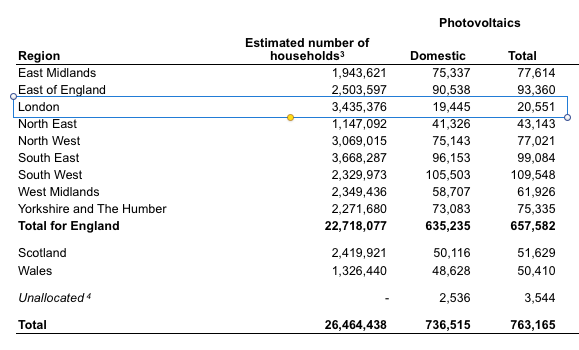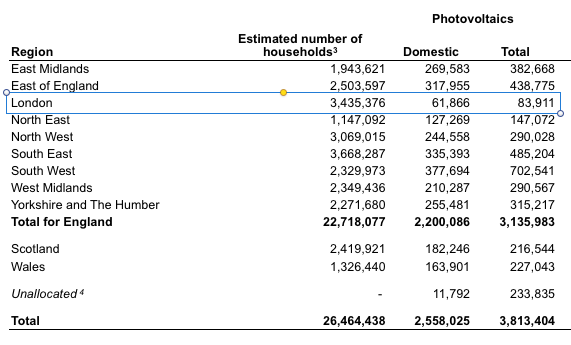Site search:
-
What’s new?
Energy for London Tags
Brent Buildings Camden Carbon Emissions CHP Cities Climate Adaptation Community Heating Community Initiatives Croydon Data DECC Decentralised Energy Distribution ECO Energy Costs Energy Efficiency Enfield FIT Fuel Poverty Funding Green Deal Hackney Haringey Housing Islington Lambeth Library Local Authorities Mayor Newham Ofgem Olympics Photovoltaics Planning RE:FIT RE:NEW Renewable Energy Retrofit Southwark Tower Hamlets Transport Waltham Forest Waste WestminsterEnergy Archives:
- February 2021 (1)
- January 2021 (15)
- December 2020 (15)
- November 2020 (9)
- October 2020 (3)
- August 2020 (5)
- July 2020 (3)
- June 2020 (4)
- April 2020 (10)
- March 2020 (5)
- February 2020 (2)
- January 2020 (3)
- October 2019 (1)
- September 2019 (4)
- August 2019 (2)
- July 2019 (1)
- August 2018 (1)
- November 2016 (8)
- October 2016 (8)
- September 2016 (2)
- August 2016 (8)
- July 2016 (14)
- April 2016 (12)
- March 2016 (16)
- February 2016 (8)
- January 2016 (4)
- December 2015 (1)
- November 2015 (1)
- October 2015 (16)
- September 2015 (3)
- June 2015 (1)
- May 2015 (1)
- April 2015 (1)
- March 2015 (1)
- February 2015 (1)
- January 2015 (1)
- December 2014 (18)
- November 2014 (4)
- August 2014 (8)
- July 2014 (7)
- June 2014 (25)
- May 2014 (8)
- April 2014 (4)
- March 2014 (12)
- February 2014 (7)
- January 2014 (13)
- December 2013 (11)
- November 2013 (15)
- October 2013 (15)
- September 2013 (18)
- August 2013 (5)
- July 2013 (20)
- June 2013 (33)
- May 2013 (8)
- April 2013 (16)
- March 2013 (25)
- February 2013 (14)
- January 2013 (20)
- December 2012 (23)
- November 2012 (23)
- October 2012 (25)
- September 2012 (14)
- July 2012 (12)
- June 2012 (43)
- May 2012 (20)
- April 2012 (8)
- March 2012 (40)
- February 2012 (39)
- January 2012 (40)
- December 2011 (22)
- November 2011 (40)
- October 2011 (33)
- September 2011 (48)
- August 2011 (40)
- July 2011 (58)
- June 2011 (41)
- May 2011 (80)
- April 2011 (38)
- March 2011 (33)
- February 2011 (25)
- January 2011 (24)
- December 2010 (3)
- November 2010 (7)
- October 2010 (6)
- September 2010 (7)
- August 2010 (1)
- July 2010 (2)
- June 2010 (4)
- May 2010 (1)
- March 2010 (3)
- February 2010 (3)
- December 2009 (5)
- November 2009 (2)
- October 2009 (3)
- July 2009 (3)
- June 2009 (1)
- April 2009 (1)
- March 2009 (1)
- February 2009 (1)
- January 2009 (1)
- December 2008 (2)
- October 2008 (1)
- September 2008 (1)
- July 2008 (1)
- March 2008 (2)
- January 2008 (2)
- October 2007 (1)
- September 2007 (3)
- July 2007 (1)
- March 2007 (1)
- February 2007 (3)
- November 2006 (3)
- August 2006 (1)
- February 2006 (1)
- May 2005 (1)
- February 2004 (1)
News
“The power revolution could soon be moving from dream to reality”
10 August 2016: Welcome to see the Evening Standard today include a major comment piece by Leo Johnson on how “Small-scale projects such as those in Newham, Brixton and Islington give a glimpse of Britain’s energy future”.
Leo highlights three projects in London as signs of how the decentralised energy model is now in the ascendancy, shifting from the “dominant energy model, the centralised production and distribution of fossil fuel-based power through the grid”.
- “In Newham, for example, the Combined Heat and intelligent Power plant (CHiP) aims to harness the energy from “fatbergs”, the bus-size balls of grease which cost Thames Water an estimated £1 million a month to remove, using teams of trained “flushers” decked out with protective white suits and shovels who descend into London’s Victorian sewer system to hack up the fat. CHiP plans to use the fat instead to power 40,000 homes.” This project is fascinating and received a lot of coverage when first announced back in 2013 – which was covered in some detail in an earlier post here – but not much further information has been forthcoming from the project on their website.
- “In Brixton, the energy group Repowering is installing solar panels on the rooftops of housing association buildings to lower fuel bills, and is teaming up with Transport for London to introduce “energy gardens” across 50 London Overground sites.” In June of this year, Repowering was awarded a prestigious Ashden Award for their work – a case study and excellent video are posted on the Ashden website here. The Energy Gardens project was covered by ITV news a few weeks ago – see video here – and more can be seen at energygarden.org.uk
- “At the Bunhill Energy Centre project in Islington, whose second phase was opened by Mayor Sadiq Khan last month, they’re using heat from the Northern line tube to power a thousand homes.” Lots more about Bunhill here.
Leo also highlights some work commissioned by the GLA by engineers Buro Happold “have estimated that there is enough heat wasted in London alone to power 70 per cent of the city’s energy needs. What’s the potential for growth? Copenhagen provides 98 per cent of its space and water heating through district heating, at 45 per cent of the cost of normal oil heating bills. London’s uptake, better than the one to two per cent national average, is currently just five per cent.” The 2013 London Secondary Heat study can be downloaded here.
Posted in Decentralised Energy, News, Renewable Energy
Tagged CHP, community energy, Community Heating, Islington, Lambeth, Newham, Photovoltaics, Waste
Leave a comment
Havering ‘Solar Parks’ Initiative
August 2016: Interesing press release from Havering issued earlier this week which stated that “Havering Council is looking to harness the power of the sun by developing solar parks on its own land to generate a significant extra income for the borough.“
“These solar parks will allow Havering to become the first borough in London to generate renewable energy on a large scale to make money, which would be used to protect and improve frontline services. Energy produced in this way is clean, sustainable and renewable.
“The land on which the solar parks will be constructed will be underused space that will result in few if any adverse effects on community usage. Once the solar park is past its useful life, the panels can be removed and the site will revert to its previous condition.”
A public consultation will be released by the council on the proposal sometime in the future.
Havering have supported solar for sometime with a range of rooftop projects across existing council buildings – and the council cites a “recent report by Greenpeace [which] placed Havering as having the second highest percentage of solar power generated by homeowners in London, with over 1100 solar panel systems installed on domestic roofs.”
Havering councillors did however turn down an application in December 2014 for a solar farm in the borough. The developer went to appeal – but national government also refused the application earlier this year.
The press release also mentions that “The proposed solar parks will also have a positive impact on local biodiversity for a range of plant and animal species, in particular broad leaved plants, grasses, wild flowers, butterflies, bees and birds. Part of the Council’s proposals would be to work with local beekeepers to promote healthy honeybee populations, as well as Britain’s rarer bumblebees, in and around the solar parks.” The National Solar Centre’s Biodiversity Guidance for Solar Developments provides further information on the ways in which solar projects can support local ecology.
Posted in Decentralised Energy, News, Renewable Energy
Tagged Havering, Photovoltaics
Leave a comment
RE:NEW retrofit case studies
August 2016: The GLA’s home energy efficiency retrofit programme, RE:NEW, has posted a series of case studies on their website. These include a range of projects including:
- Retrofit of 204 properties at Lansdowne Green in Stockwell across
12 blocks all with a SAP rating of below 65. - Converting individual electric heating to communal gas heating in 800 units across 10 blocks in Hackney
- Other projects profiled include retrofits in Tower Hamlets and Merton.
Posted in Energy Efficiency, News
Tagged Hackney, Lambeth, Merton, RE:NEW, Tower Hamlets
Leave a comment
Latest London PV statistics
August 2016: The last set of sub regional Feed in Tariff (FIT) statistics published by DECC – before it is merged with the business department into BEIS – were published last week (available here). London PV data – alongside other UK regions – is reproduced below.
Table 1. Cumulative installations confirmed on the Central Feed-in Tariff Register by Region
Table 2. Cumulative capacity confirmed on the Central Feed-in Tariff Register by Region
So – as at the end of June 2016:
- London had 20,551 PV installations (95% of which were domestic installations) with a total combined electrical generating capacity of 83.911MW.
- London’s capacity represented just 2% of total UK PV generating capacity
- The last FIT quarterly data set (for data up to the end of March 2016) reported that London had 20,123 PV installations in London and 81.623 MW – indicating a 2.28MW increase in capacity over the last three months.
Mayor Elected C40 Vice Chair
 25 July 2016: The Mayor has today been appointed a Vice Chair of C40 Cities, representing the Europe region on the group’s steering committee, alongside Copenhagen. C40’s press release included the following statement from the Mayor:
25 July 2016: The Mayor has today been appointed a Vice Chair of C40 Cities, representing the Europe region on the group’s steering committee, alongside Copenhagen. C40’s press release included the following statement from the Mayor:
“… I want London to be at the cutting edge of new green technologies, generating the growth and jobs of the future. My new ambitions for Energy for Londoners, and my new role as Vice Chair of the C40 will ensure that London is a beacon to the world and helps to generate the opportunities that will accelerate the pace of change to create better cities for all.”
The next major convening of the C40 Steering Committee will take place at the C40 Mayors Summit, which will bring together mayors and sustainability leaders from all over the world. It will be held in Mexico City November 30 – December 2, 2016.
Energy and Climate Questions to the Mayor
July 2016: This month Mayor’s Question Time included the following:
an update on a GLA study to evaluate the potential for the use trackside solar power production; Post Brexit, how the Mayor will use his role in the Brexit negotiating team to preserve the hard-fought environmental protections; the number of decentralised energy projects that are projected to come online this year; how the Mayor can encourage Londoners to switch energy suppliers; an estimate of the number of connections that will be provided with heat from the Beddington energy from waste plant to the Sutton Decentralised Energy Network (SDEN) – and whether Barratt Homes has signed a heat agreement with the plant’s operator, Viridor; whether the Mayor will respond to the Government’s recently released Energy Company Obligation (ECO) consultation;
work to encourage energy efficiency improvements in the private rented sector (PRS);
the RE:NEW home energy efficiency retrofit programme’s strategy over the coming year; the number of jobs linked to the green economy in London; the Mayor’s role with C40 Cities, and borough surface water management plans
Previous months questions to the Mayor can be found here.
Posted in News, Renewable Energy
Tagged Brexit, Climate Adaptation, Community Heating, Decentralised Energy, Energy Efficiency, Housing, Photovoltaics, RE:NEW, Sutton, Transport, Waste
Leave a comment
London Hydrogen Action Plan Programme Approved
July 2016: GLA approval of the London Hydrogen Action Plan funding for 2016/2017 which includes work:
“…. on delivering the London Hydrogen Action Plan (LHAP). LHAP makes the case for hydrogen investment and sets out the strategic framework and timeline (from now until 2017) for an action plan addressing vehicles and infrastructure, production and storage, stationary and early market applications. It aims to move beyond demonstrations and trials and to commercialise hydrogen and fuel cell projects that support the Mayor’s environmental, transport, social, economic and development priorities.”
Full information on the approval document can be seen on the GLA website here and further background to the London Hydrogen Action Plan at hydrogenlondon.org
New GLA Decentralised Energy Framework Notice
July 2016: The GLA have issued a tender to secure a range of services related to supporting the growth of decentralised energy projects in the capital:
The tender (GLA80814 – Decentralised Energy Framework) (direct download) sets out that the GLA seeks consultants with experience in:
- developing business cases and business plans for DE projects
- structuring templates for project delivery
- providing commercial advise to private and public sector clients in negotiating key agreements
- assessing different delivery vehicles and ownership structures, such as Public Private Partnership (PPP) options — Special Purpose Vehicle (SPV) and Joint Venture (JV) structures
- producing early project commercial documentation (including risk registers) and agreements
- working with financial advisors in providing guidance on possible funding sources, including maintaining relationships with banks and investment boutiques
- in-depth knowledge of energy markets, energy trading and negotiations.
Much of the work undertaken in this area to date, carried out by the GLA through the Decentralised Energy Project Delivery Unit (DEPDU) – which officially closed in July 2015 – is posted online at www.londonheatmap.org.uk.
Posted in Decentralised Energy, News
Tagged CHP, Community Heating, Decentralised Energy
Leave a comment
Smart Cities and the Built Environment
 14 July 2016: Osborne Clark – the “smart cities law firm” – released a report last week examining how “how smart built environments leverage data, new technology and innovative and collaborative thinking to deliver services that benefit citizens”.
14 July 2016: Osborne Clark – the “smart cities law firm” – released a report last week examining how “how smart built environments leverage data, new technology and innovative and collaborative thinking to deliver services that benefit citizens”.
The report Smart cities in Europe: The future of the built environment includes a profile of the regeneration of Kings Cross: “Why is this redevelopment a good example of a smart built environment? For a start, the building utilises renewable energy. Solar
panels that generate around 10% of the
station’s energy requirements were installed
on the 2,500m² renovated train shed roof. A
combined heat and power (CHP) plant will
also provide locally generated power to new
businesses and homes on the site.”
Posted in Decentralised Energy, Library, News, Renewable Energy
Tagged Camden, CHP, community energy, Photovoltaics, smart cities
Leave a comment
Islington District Heating Planning Guidance Published
 July 2016: Islington have recently published new environmental design planning guidance on heat networks: The guidance is released in two parts – with Part 1 giving an overview of the existing and and planned Islington heat networks, as well as an introduction to the principal behind heat networks (referencing the GLA’s 2014 London Heat Network Manual). Part 2 provides technical guidance to developers looking to connect to Islington’s Bunhill heat and power network.
July 2016: Islington have recently published new environmental design planning guidance on heat networks: The guidance is released in two parts – with Part 1 giving an overview of the existing and and planned Islington heat networks, as well as an introduction to the principal behind heat networks (referencing the GLA’s 2014 London Heat Network Manual). Part 2 provides technical guidance to developers looking to connect to Islington’s Bunhill heat and power network.
The Council sets out that it is “committed to working with partners to promote and develop decentralised energy (DE) networks, with a particular focus on areas of the borough with the greatest potential for such networks. Existing DE networks within the borough will be protected and their expansion supported. All development will be required to contribute to the development of DE networks, including by connecting to such networks where these exist within the proximity of the development.”
Posted in Decentralised Energy, News, Uncategorized
Tagged Community Heating, Decentralised Energy, Islington
Leave a comment
Sadiq “…off to a great start”
13 July 2016: Great Carbon Brief interview with Mark Watts, CEO of the C40 Cities group. Prior to his role at C40, Mark was the energy and climate change lead in City Hall during Ken Livingstone’s two terms as Mayor, where ground breaking initiatives such as London’s congestion charge and the 2007 Climate Change Action Plan were introduced.
The exchange covers many key areas across the city and climate agenda, and ends with a short discussion on London – with some positive remarks made by Mark on new Mayor, Sadiq Khan, first weeks in office – but pointing out that “We await with interest him appointing a deputy mayor for environment, which is absolutely needed.” Though a number of Deputy Mayors have been appointed by Sadiq over the past few weeks (Transport, Culture, Business, Housing etc) – an environment role remains vacant.
“CB: Okay, and much closer to home — what does a London of the future look like to you?
MW: Well, I think London actually starts from quite a good place, because here we already have a very high degree of green space. We’ve got a good level of density. It could it be a bit denser, a bit more like Paris perhaps, but basically the legacy of the Georgians and the Victorian era has been quite helpful for us. I think the thing that probably where London has the greatest opportunity — it actually links back to your question around the investor community — is that London also has the benefit of not merely of being in some sense a model for how a low carbon city works, with this very great public transport system, having a congestion pricing already in place, and all the green space, but also has a large degree of the investor community here, that if we can unlock that capital that’s sitting there ready to be used to build a green economy of the future, then you really will be able to realise the vision of a future low carbon city. And also one, you know, in a context of Brexit, one of the great things about London is its extraordinary cultural diversity, and I suspect that the cultural diversity is going to be a great benefit to delivering a low carbon world, because the cities where people of all different cultures and religions and geographies, have already learned to work together so well, as they have London, are most likely to be the ones that can also cooperate around this extraordinary challenge of avoiding catastrophic climate change.
CB: And do you have high hopes for Sadiq Khan in taking us towards this?
MW: Well, he’s got off to a great start, hasn’t he? I think this huge focus on settling inequality and some really bold moves within the first few weeks. We await with interest him appointing a deputy mayor for environment, which is absolutely needed. They need that senior level leadership and focus as has happened under the previous mayors. But, yeah, I think we expect great things from Mayor Khan.”
Will the new Energy Secretary push the cities and climate agenda?
14 July 2016: The Department of Energy and Climate Change (DECC) is no more. Rumours started early on in the day via a tweet from the Editor of ConservativeHome:
This was followed shortly after by Energy Minister Andrea Leadsom failing to deny rumours during DECC Oral Questions session in the House of Commons.






